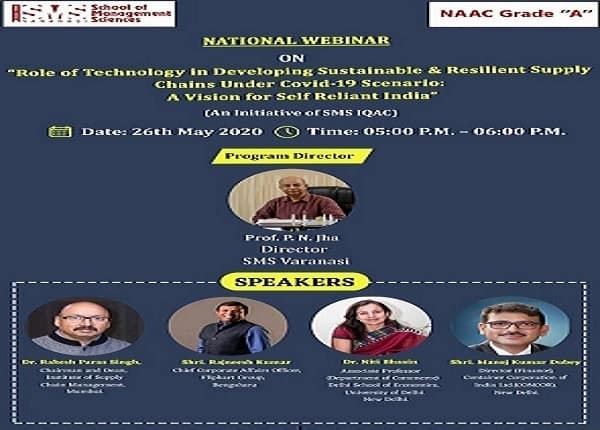
Webinar on Role of Technology in Developing Sustainable and Resilient Supply Chains under COVID-19 Scenario: A Vision for Self Reliant India
School of Management Sciences, Varanasi, has organized a National Webinar on Role of Technology in Developing Sustainable and Resilient Supply Chains under COVID-19 Scenario: A Vision for Self Reliant India on May 26th, 2020 from 5 PM to 6 PM. The key resource person for this webinar was Dr. Rakesh Paras Singh Chairman and Dean Institute of Supply Chain Management Mumbai. Shri. Rajneesh Kumar Chief Corporate Affairs Officer, Flipkart Group, Bengaluru. Dr. Niti Bhasin Associate Professor Department of Commerce Delhi School of Economics University of Delhi, New Delhi. Shri. Manoj Kumar Dubey Director (Finance) Container Corporation of India Ltd. (CONCOR) New Delhi.
Prof. P. N. Jha Director School of Management Sciences Varanasi warmly welcomed the resource persons and participants nationwide. Prof. Jha stated that todays business organizations had been heavily hit by this Covid19 and facing serious imprecations. More than 180 countries worldwide are facing this pandemic, and India cannot afford to remain isolated. However, our economy has been heavily suffered, reaching the stage of the devastation of the entire market scenario. The CARE rating agency has indicated that Indian GDP would be expected to be around one-percent during 2020-2021. Among all sectors, the job market been heavily hit, and organizations today are lying off to sustain themselves in the current market scenario. Since China is the epicenter of Covid19, which resulted in more than 190 million people lost their job and has a severe effect on their livelihood. The government of India has taken a step like self-reliant, and to achieve this position, India should work on its physical and financial resources, bring back its talent from abroad, and substantial investment should be made in Research and Development program.
Dr. Nitin Bhasin, in her view, stated that disruption in china has led to disruption in the whole world in areas of supply chain management, as china is the epicenter of many products manufacturing, which are used in different corners of the world. She also talked about the role of India in the global supply chain; in todays era, one product is not made in one country; instead, its different parts are made in various countries around the world, where India has played the very least role till date. Hence, for India to enter into the line of the global supply chain, it should develop its self-sufficiency in many sectors, but also exclude some industries, as India should not act against toward free trade policy of WTO. Three main problems that India faces to be part of the global supply chain is Scale, Cost, and Efficiency. Still, another way round Indian policies are favoring the start-ups, policy for entrepreneurship, and positive environment for innovation but still lacks in attracting investors for financial resources and least technological penetration in the MSME sector. Dr. Rakesh Parash Singh further raised an essential question regarding self-sufficiency: Like 75 percent of pharma product is imported, how can India manage its short supply if these imports are stopped. Another crucial question regarding the mass exodus of workers leaves the industry in India at high risk in operation post lockdown. He also stated some solutions that could be used to remove such bottlenecks, such as Big data in the supply chain and laser tracking system of its product supply locations. Shri. Manoj Kumar Dubey elucidated that many sectors were working during the lockdown period; it would not have been possible without technological use. Work, which took 15 days using manual worker, was completed in 01 days with the help of technology. Shri. Rajneesh Kumar shared a practical example of Karnataka, where mangoes of farmers could not sell due to lockdown issues. Still, with the help of technology, farmers were able to sell their products. He also stated three important solutions for improvising the Indian supply chain system: tracing, scaling, and digitalization.
Vote of thanks was given By Mr. Kartikeya Singh Assistant Professor School of Management Sciences Varanasi. This session was organised and coordinated by Mr. Veeresh Tripathi Assistant Professor School of Management Sciences Varanasi.
